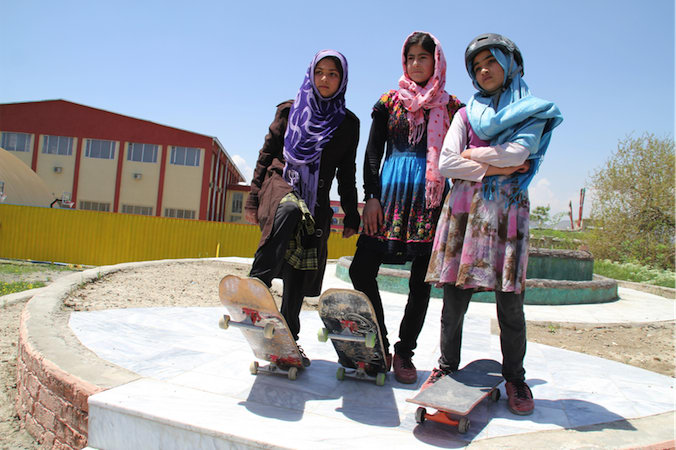5 Important Non-Profits Making Skating More Inclusive For Everyone
These organizations are showing solidarity with marginalized communities the world over.
Although it can be a solitary activity, skateboarding is not just about you and your board. Across skate scenes all around the globe, what makes the sport so special is the communities that surround it. That focus is key to the work of the following five non-profit organizations, which work across the U.S. as well as in Afghanistan, South Africa, Palestine, Cuba, and Cambodia. Through building parks, giving skate lessons, and handing out boards, these non-profits are tapping into skateboarding as a means to incite positive change, creating solidarity amongst people suffering from economic inequality, gender discrimination, or social exclusion. Read on to learn more about their work.
1. Skateistan
 Courtesy Skateistan
Courtesy Skateistan
Skateistan host weekly skate lessons for vulnerable children aged 5-17 in towns across Afghanistan, South Africa, and Cambodia. The organization began in 2007 when Australian skateboarder Oliver Percovich went to Kabul, Afghanistan, and started teaching local kids how to skate. Skateistan has particularly flourished in Kabul, where its first official school opened in 2009. Because skating is relatively new to the country, it isn’t seen as a gendered activity. As a result Afghanistan now has the highest number of women skaters in the world.
But skating isn’t all that Skateistan does. 50% of their students have dropped out of school to work, so a core goal for this non-profit is to break this cycle of poverty. Through their Back To School program, they help transition out-of-school kids back into education by tutoring them in basic numeracy and literacy enabling them to pass re-entrance exams for school.
Because Cuba is a socialist state, the government must approve all new businesses. While not technically illegal, skateboarding isn’t officially recognised as a sport by the authorities meaning there are no skate shops on the island — forcing the country’s burgeoning skate scene to rely solely on international donations.
Noticing this lack of provisions, Lauren Bradley and Miles Jackson founded Cuba Skate in 2010 to support the country’s skate culture. From their base in Washington D.C., the non-profit helps by donating refurbished boards and overseeing skatepark renovations. But given Cuba’s strained diplomatic relations with the U.S., exchange of goods isn’t as simple as just mailing a box of merchandise. Instead, Cuba Skate’s volunteers fill their suitcases to the brim with boards, trucks, and wheels before traveling from the U.S. Their ultimate goal is to help create a self-sustaining skate scene across Cuba — and they’re already making strides, with a recently launched project that enables Cubans to make their own decks.
A.skate is dedicated to make skating accessible for children with autism. Its founder, Crys Worley, began A.skate in 2009 after seeing how much her son Sasha, who has autism, thrived on a board.
Kids with autism can find team sports alienating, so the often solitary aspect of skating makes it a comfortable and fun activity. But it can also be a form of occupational and behavioural therapy, helping the kids work on motor skills and brush up on social skills by learning basic skatepark etiquette.
A.skate is based in Birmingham, AL, but it works with volunteers and skateparks across Florida, Arizona, California, Texas, and Hawaii. At their free classes, volunteers help the students learn in one-on-one sessions catering to their learning speed and skate ability, also providing boards, helmets, and pads. A.skate is dedicated to providing children with autism a safe environment to learn, rip, and progress.
Economic blockades, tear gas, and the constant threat of a full scale attack are all parts of everyday reality in occupied Palestine. Young people under the age of 21 make up more than half of all Palestinians living in the occupied territories, and have few social, educational, or recreational opportunities. In 2006 Charlie Davis volunteered as a English teacher in the West Bank's city of Jenin, and, noticing a local interest in skate culture, returned in 2012 to set up SkatePal. Since then, the non-profit has taught hundreds of kids how to skate and has built skateparks and mini ramps in the West Bank towns of Ramallah, Zebabdeh, and Asira Al-Shamaliya, providing a safe place for locals to gather and shred.
Founded by Native American skateboarder Todd Harder in 2006, Nibwaakaawin is focused on empowering indigenous communities through skateboarding. While it covers all aspects of the sport, Nibwaakaawin is most known for the All Nations Skate Jam, which celebrated its 10th anniversary this year. The Jam is held every in year in Albuquerque, NM, to coincide with North America's largest annual Native American event, Gathering of the Nations.
While there is outside involvement — from their sponsors Vans and non-Native pro skaters who attend the Skate Jam — Nibwaakaawin is for the Native community. They promote their own skaters, encourage mentorship relationships, and show Native youth career options in skating and the arts. Because Nibwaakaawin are rooted in the community they serve, their work enables skateboarding to co-exist with indigenous traditions, and its participants to feel pride in both skating, and in their culture.